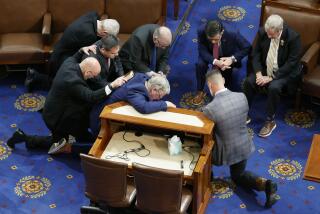No God on his side
THERE ARE A gazillion ways to get into trouble in Washington, but Rep. Pete Stark (D-Fremont) has picked one of the rarest: He has come out of the closet and acknowledged that he does not believe in God.
Stark outed himself in a questionnaire from the Secular Coalition for America, which searched for elected officials willing to identify themselves as nonbelievers. It found only four, including Stark, and it claims that he is “the first open nontheist in the history of the Congress.”
“Nontheist,” by the way, is the latest secularist term of art for folks “without a god-belief,” replacing the traditional terms “atheist” and “agnostic.” (The former believes there is no God; the latter isn’t sure.) But the American Humanist Assn. -- and who’s not a humanist? -- prefers nontheist because most Americans wrongly think that atheists are anti-theists: people who not only don’t believe but also object to others’ belief in God(s). The association took out an ad in the Washington Post on Tuesday to congratulate Stark for his “courageous decision.”
Courage comes in many forms, and maybe responding to a questionnaire is one of them. In this case, however, Stark is hardly taking a risk; he has represented a left-leaning Bay Area district since 1973. Still, those who fail to profess at least a vague belief in some kind of supreme being are not likely to succeed in politics. In a Gallup poll last month, 53% of respondents said they would not vote for an otherwise well-qualified atheist -- far more than wouldn’t vote for a homosexual (43%), a 72-year-old (42%), someone married for the third time (30%), a Mormon (24%) or a woman (11%).
That’s perhaps unsurprising given that 47% of Americans in a 2002 Pew survey said religious belief is a prerequisite to be a good person. And then there’s the biblical injunction against cavorting with the enemy (2 Corinthians 6:14): “Do not be yoked together with unbelievers. For what do righteousness and wickedness have in common?”
Unbelievers are clearly among the most distrusted members of American society. But it’s not clear how many there are. A University of Minnesota study estimated atheists at 3% of the U.S. population; a Pew survey found 11% declaring “no religion, not a believer, atheist [or] agnostic,” and a Harris Interactive poll put nonbelievers at 9% with an additional 12% expressing uncertainty.
Whatever their number, it is statistically unlikely that Stark is the only nontheist among the 535 members of Congress. But he may be the most honest.
More to Read
Get the L.A. Times Politics newsletter
Deeply reported insights into legislation, politics and policy from Sacramento, Washington and beyond. In your inbox three times per week.
You may occasionally receive promotional content from the Los Angeles Times.










